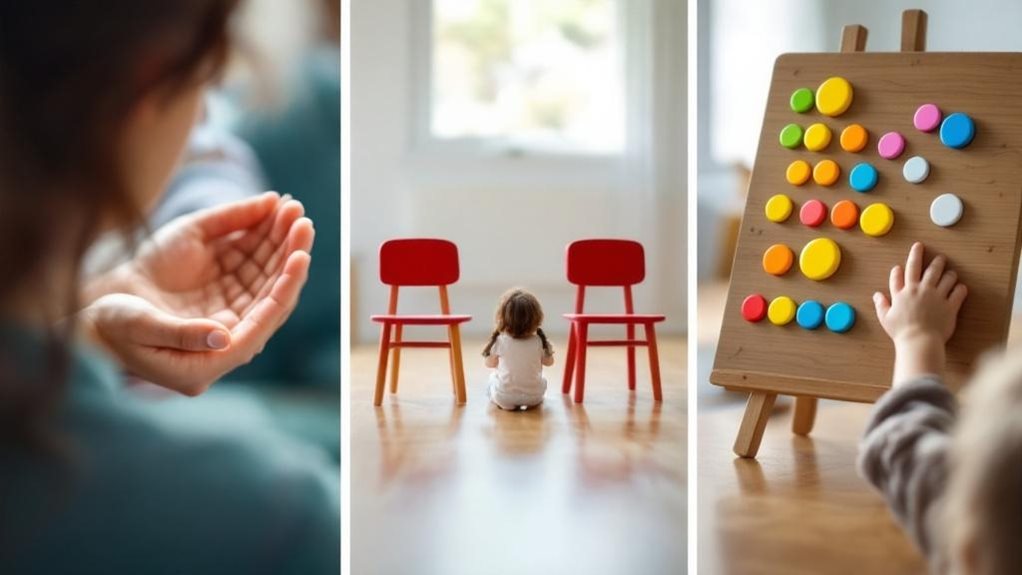Physical Address
304 North Cardinal St.
Dorchester Center, MA 02124
Physical Address
304 North Cardinal St.
Dorchester Center, MA 02124

Navigate proven behavioral therapy techniques that transform oppositional children's challenging behaviors into cooperative responses through specialized interventions.
You’ll find the most effective approaches are Cognitive-Behavioral Therapy, which restructures your child’s negative thought patterns and teaches emotion regulation skills; Parent-Child Interaction Therapy, particularly beneficial for ages 2-7, strengthening foundational relationships through real-time coaching; and Dialectical Behavior Therapy, targeting emotional dysregulation with mindfulness practices and interpersonal effectiveness training that reduces aggressive behaviors by 50%. Each evidence-based intervention addresses specific developmental needs while building long-term coping strategies your family can explore further.
When children display persistent patterns of defiant and oppositional behaviors, cognitive-behavioral therapy (CBT) offers a structured, evidence-based approach to address the underlying cognitive distortions that fuel these maladaptive responses. You’ll find that CBT’s theoretical foundation centers on the interconnectedness of thoughts, feelings, and actions, making it particularly effective for children with ODD.
Through negative thought restructuring, you can help children identify and challenge distorted thinking patterns that contribute to oppositional behaviors. CBT teaches them to recognize triggers for outbursts while understanding the consequences of their actions. Behavior modification strategies replace maladaptive responses with constructive alternatives.
You’ll implement emotion regulation techniques, including relaxation practices and anger management skills. The combination of parent training and problem-solving skills training proves particularly beneficial for children aged seven and older. Parent involvement strengthens therapeutic outcomes through consistent reinforcement and improved communication strategies, creating lasting behavioral changes.
While cognitive-behavioral interventions address thought patterns in older children, Parent-Child Interaction Therapy (PCIT) targets the foundational relationship dynamics that perpetuate oppositional behaviors in younger children aged 2-7 years.
PCIT employs interactive coaching to enhance caregiving skills through real-time feedback mechanisms. You’ll provide emotional support while teaching specific behavioral management techniques that strengthen parent-child communication patterns.
| Component | Focus | Outcome |
|---|---|---|
| Interactive Coaching | Real-time parent guidance | Enhanced interaction skills |
| Emotional Support | Parent-child regulation | Improved family dynamics |
| Skill Development | Behavioral management | Reduced externalizing behaviors |
| Feedback Mechanisms | Individualized interventions | Tailored treatment approach |
| Parental Involvement | Active participation | Strengthened relationships |
The 18-week structured protocol demonstrates significant effectiveness across diverse populations, though completion remains vital for ideal therapeutic outcomes in treating conduct problems. The therapy progresses through two distinct phases: Child-Directed Interaction (CDI) which teaches PRIDE skills including Praise, Reflect, Imitate, Describe, and Enjoy, followed by Parent-Directed Interaction (PDI) that focuses on behavior management techniques.
As oppositional behaviors often stem from underlying emotional dysregulation, Dialectical Behavior Therapy (DBT) provides an extensive framework for developing essential coping mechanisms in children and adolescents with ODD. You’ll find that DBT skills training combines cognitive-behavioral techniques with mindfulness practices, targeting four core competency areas that build emotional resilience.
Through structured skills groups and individual sessions, children learn emotion regulation, distress management, core mindfulness, and interpersonal effectiveness. These evidence-based interventions teach youth to observe experiences without judgment while developing healthy coping strategies. Studies demonstrate that teens participating in DBT show 50% reductions in negative symptoms, including aggression and defiance.
You can implement distress management techniques that help children defuse intense emotions safely rather than acting impulsively, creating sustainable behavioral changes. The DEARMAN skill teaches children to make polite requests without demands, which helps prevent conflicts and enhances empathy during interactions with family members and peers.